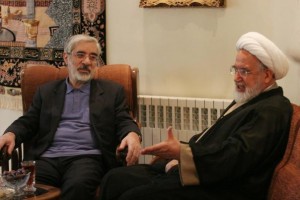 Babak Siavoshy of Georgetown University offers a guest comment for Enduring America:
Babak Siavoshy of Georgetown University offers a guest comment for Enduring America:I disagree with much of the reaction against [Mir Hossein] Mousavi's five-part proposal to resolve the conflict, expressed in his 1 January statement. If I understand the five goals he sets forward correctly, they are as follows:
1. Government accountability
2. The legislation of new and clear election laws, including, presumably, laws that would give some measure of protection to reform-oriented candidates from vetting by the unelected branches
3. The release of all political prisoners
4. Freedom of the press and the media
5. The recognition of the right to associate and demonstrate
Iran: The Non-Violent “Watershed” of the Mousavi Statement (Shahryar)
Iran: A Gut Reaction to Mousavi’s “Martyrdom v. Compromise” Statement (Lucas)
Iran Document: Mousavi’s “5 Stages to Resolution” Statement (1 January)
The Latest from Iran (4 January): Watching and Debating
I find it hard to imagine a society that reached these five goals and at the same time failed to meet Western standards of democratic acceptability.
If it is possible to reach these five goals and still maintain the current theocratic structure -- which, clearly, is Mousavi's wish -- then why not? What is the problem with that? Would we object to velayat-e-faqih [clerical authority] and theocratic rule with the same vehemence if Iranian society was able to maintain relatively free elections, a free press, government accountability, and the right to associate? Isn't "democracy" largely a proxy for these goals?
I cannot help but feel that the radical nature of these five proposals has largely been lost in Mousavi and [Mehdi] Karroubi's uncharismatic delivery. These proposals delineate the rough outlines of a democracy. Nothing more, nothing less.
It is structurally impossible for the present regime to fully embody these five characteristics without fundamental change. The Constitution would have to be amended or reinterpreted. Entrenched leaders would have to forego their power. The Revolutionary Guard would have to give up their economic aspirations.
I think that whether or not he knows it, Mousavi is asking for fundamental change. But he is asking for it in a way that maximizes the possibility that the regime will capitulate. He thinks he can get some election reform. He thinks he can leverage some free-press initiatives. He thinks that he can get some protection for
political dissidents.
I do not know if he can. But I think his strategy is a good one. I think that if the current movement were able to leverage even a few of these proposals from the current regime, the Iranian democratic movement will be
one giant and anticlimactic step closer to victory. How long can an autocracy last with a free press? How long can an autocracy last with free elections, or the right to associate? I suspect that even mild gains
in these areas, if they could be sustained for longer than they were during the early Khatami [Mohammad Khatami, President 1997-2005] years, would have huge payoffs, facilitating internal change within the regime, and leading to a democratic system down the line.
Accept one proposition for me: that if the Green Movement evolves to an "all-or-nothing" movement -- radical change, or nothing at all -- it will end up with nothing at all. If you disagree, then stop reading. If you agree, then you know that the movement must pick its battles. It must pick the issues for which it will fight. Mousavi and Karroubi's five goals are a healthy start to this process.
Those who want a revolution for its own sake will be disappointed in a measured approach like the one offered by Mousavi. Those who see a revolution, or social change, as a proxy for government accountability,
democratic agency, and freedom of speech and association, should take this type of approach more seriously.
 Monday, January 4, 2010 at 22:59
Monday, January 4, 2010 at 22:59  Iran: Leaks abound relating to Iran. Is Washington "genuis punditocracy" putting pressure on Israel relating to nukes and sanctions? EA's Scott Lucas' reaction is here : he wonders whether the policy may be "too clever by half" but guest writer Gary Sick praises President Obama's "strategic leaking".
Iran: Leaks abound relating to Iran. Is Washington "genuis punditocracy" putting pressure on Israel relating to nukes and sanctions? EA's Scott Lucas' reaction is here : he wonders whether the policy may be "too clever by half" but guest writer Gary Sick praises President Obama's "strategic leaking".
 Babak Siavoshy of Georgetown University offers a guest comment for Enduring America:
Babak Siavoshy of Georgetown University offers a guest comment for Enduring America: